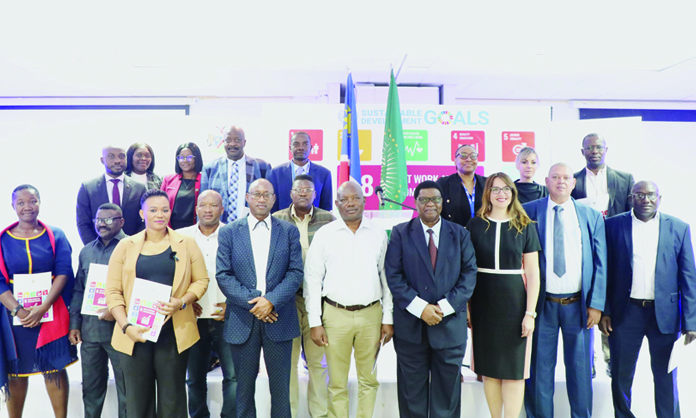The Ministry of Labour, Industrial Relations and Employment Creation, in collaboration with the International Labour Organisation (ILO), yesterday launched a mechanism to enhance working conditions in the fishing sector.
The National Coordination Mechanism (NCM) on Decent Work within the Namibian Fisheries Sector was launched at Walvis Bay.
The NCM will be responsible for overseeing compliance with international labour standards and facilitating dialogue among stakeholders to enhance working conditions and operational efficiency.
It presents the opportunity for Namibian businesses to explore existing local and international markets and enhance business sustainability and diversification.
A business forum was also held, aimed at advancing the cause of decent work within the Namibian fisheries supply chain, and enlightening stakeholders about decent work issues within the sector.
Labour minister Utoni Nujoma said although the fisheries sector plays a crucial role in Namibia’s economy, providing employment and uplifting the livelihood for many of our citizens, it is challenged by issues relating to decent work, occupational health and safety, forced labour, as well as violence and harassment on some vessels using Namibian ports.
“We are all aware that decent work is not just a moral imperative, it is also essential for sustainable development. When workers are treated fairly, paid a decent wage, and provided with safe working conditions and environment, they are more productive, profitable and contribute more effectively to economic growth.
“It is therefore of the utmost importance to take cognisance of adequate and appropriate measures to promote good basic conditions of employment, and preventing accidents and disease at work.
“It is disheartening to know these measures are often not available, especially in some organisations where employee welfare, safety and health are not prioritised,” he said.
The NCM team will serve for five years, with their main functions including supporting and coordinating the full implementation and enforcement of Convention No. 188.
They will also keep progress made regarding the implementation and enforcement of Convention No. 188 in Namibia under continuous review.
The team will further provide advice to the labour ministry, the Ministry of Works and Transport, and the Ministry of Fisheries and Marine Resources, and facilitate compliance with the convention and international labour standards, while submitting suggestions and observations to the competent authority.
ILO transport and maritime sector specialist Christine Bader congratulated and encouraged the group on the way forward.
“I encourage you, because coordination is a work in progress and there’s always room for improvement. There may be a need to clarify, for the benefit of officials across all different administrations, what information to gather and analyse, what to share and with whom, and, during inspections, what decision to take in case of an identified red flag.
“If the relevant authority has the mandate to deal with the matter at hand, investigate and act. If there is no mandate, the decision should not be inaction, but a referral.
“Complaint mechanisms are usually also an issue that requires some coordination and tweaking to ensure that the grievance of the fisher does not fall through the cracks. ” she said.
Stay informed with The Namibian – your source for credible journalism. Get in-depth reporting and opinions for
only N$85 a month. Invest in journalism, invest in democracy –
Subscribe Now!






